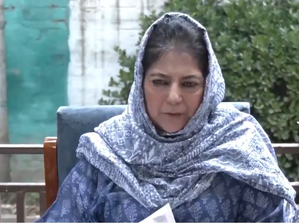Srinagar: Former J&K Chief Minister and President of Peoples Democratic Party (PDP) Mehbooba Mufti on Friday alleged that the Income Tax Department is unfairly targeting the traders involved in the Line of Control (LoC) trade.
“They (LoC traders) are being unfairly targeted for taxes despite the trade being a barter system with no financial transactions. The Income Tax Department has been demanding taxes from LoC traders, who have become helpless and unemployed since the trade was suspended in 2019,” the former Chief Minister said while addressing a press conference.
She added that taking tax from these traders is unjustified and appealed to the Union Home Minister Amit Shah to intervene and resume the trade which was initiated by Atal Bihari Vajpayee and started during Manmohan Singh’s tenure.
“These traders have been struggling since the suspension of trade. The LoC trade was a key confidence-building measure (CBM) between two parts of Kashmir,” the former Chief Minister said.
She added that there is a deliberate attempt to disempowerment the people of Kashmir and the seizure of traders’ properties.
On April 19, 2019, the Ministry of Home Affairs (MHA) suspended the LoC trade in Jammu & Kashmir over alleged misuse by the Pakistan-based elements for funnelling illegal weapons, narcotics, fake currency etc.
The LoC trade is meant to facilitate the exchange of goods of common use between local populations across the LoC in Jammu & Kashmir.
The trade is allowed through two Trade Facilitation Centres located at Salamabad, Uri, District Baramulla and Chakkan-da-Bagh, District Poonch.
The trade takes place four days a week and is based on the Barter system and zero duty basis.
Initiated in 2008, this barter trade achieved a cumulative value of over $1.2 Billion which is a significant amount considering the nature of border economies in Jammu and Kashmir.
The engagement of multiple stakeholders like traders, labourers, transporters, etc., in this trade created employment opportunities for the people living in these areas.
This trade generated around 170,000 labour days, or $12 million, for labourers and freight of around $88 million.
–IANS


Comments are closed.